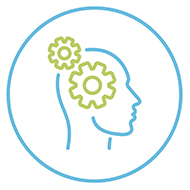Cognitive Behavioral Therapy

At MIND, we offer a goal-oriented approach to CBT, recognizing the interconnectedness of your thoughts, behaviors, and mood. Our collaborative therapy empowers you to identify and prioritize your goals while overcoming obstacles that hinder your progress, leading to lasting improvements in your well-being.
Benefits of CBT at MIND:
With the support of CBT at MIND, you can expect to experience positive changes and maintain them over time. Our skilled therapists will guide you in gaining insight into your thoughts and behaviors, empowering you to develop effective coping strategies and enhancing your overall mental health and resilience. CBT equips you with the tools and skills necessary to navigate life’s challenges, enabling you to lead a more fulfilling and satisfying life.
During your personalized sessions at MIND, our therapists will help you:
- Recognize your challenges with clarity, fostering a deeper understanding of their impact on your life
- Critique and challenge faulty thought patterns, replacing them with more rational and constructive thinking
- Distinguish between facts and baseless thoughts, promoting a more balanced perspective
- Comprehend how past experiences influence your current emotions and beliefs, fostering personal growth and healing
- See different perspectives, promoting more flexible thinking and problem-solving
- Understand and interpret other people's behaviors and interactions, leading to healthier relationships
- Cultivate positive thinking patterns and develop a more optimistic outlook on life
- Gain better awareness and understanding of your mood, helping you manage and regulate emotions effectively
- Create achievable goals, providing a clear direction for personal growth and success
- Avoid generalizations and all-or-nothing thinking, fostering a more nuanced and balanced view of situations
- Cultivate self-compassion and stop blaming yourself for everything, contributing to improved self-esteem and well-being
- Face fears and challenges directly, rather than denying or avoiding them, fostering personal growth and resilience
Our skilled therapists at MIND are experienced in using CBT to effectively address a wide range of mental health challenges and emotional difficulties, including but not limited to:
- Depression
- Anxiety Disorders
- Post-Traumatic Stress Disorder (PTSD)
- Obsessive-Compulsive Disorder (OCD)
- Stress Management
- Anger Management
- Substance Abuse and Addiction
- Eating Disorders
- Insomnia and Sleep Disorders
- Chronic Pain Management
- Adjustment Issues
- Phobias
At MIND, we are dedicated to providing personalized CBT sessions that cater to your unique needs and circumstances. Let us help you embark on a journey of self-discovery, personal growth, and lasting positive change.
